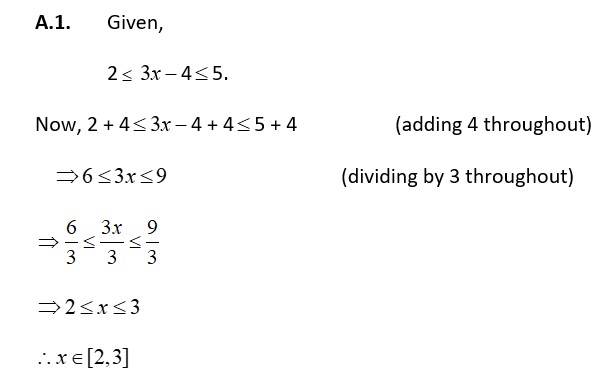Ncert Solutions Maths class 11th
Get insights from 1.6k questions on Ncert Solutions Maths class 11th, answered by students, alumni, and experts. You may also ask and answer any question you like about Ncert Solutions Maths class 11th
Follow Ask QuestionQuestions
Discussions
Active Users
Followers
New answer posted
5 months agoContributor-Level 10
20. LetP(n): 1 is divisible by 11.
Putting n = 1
is divisible by 11.
Which is true. Thus, P(1) is true.
Let us assume that P(k) is true for some natural no. k.
P(k)=
(1)
we want to prove that P(k +1) is true.
=1100a 99= 11(100a 9)
11b where b= (100a 9)
is divisible by 11.
is true when p(k) is true.
Hence by P.M.I. P(n) is true for every positive integer.
New answer posted
5 months agoContributor-Level 10
19. We can write the given statement as
P (n): n (n +1) (n+5), which is multiple of 3.
If n= 1, we get
P (1)=1 (1+1) (1+5)=12, which is a multiple of 3 which is true.
Consider P (k) be true for some positive integer k
k (k+1) (k+ 5) is a multiple of 3
k (k+1) (k+5)= 3 m, where (1)
Now, let us prove that P (k + 1) is true
Here,
(k+ 1) { (k+1)+ 1} { (k+1)+ 5}
We can write it as
= (k +1) (k+ 2) { (k + 5) + 1}
By Multiplying the terms.
By eqn. (1)
= 3m + 2 (k + 1) (k + 5) + (k + 1) (k + 2)
= 3m + (k + 1) {2 (k + 5) + (k +2)}
= 3m + (k + 1) {2k + 10 +k + 2}
= 3m + (k + 1) (3k +12)
= 3m + 3 (k + 1) (k+ 4)
=3 {m + (k + 1) (k + 4)}
3 9 wh
New answer posted
5 months agoContributor-Level 10
18. We can write the given statement as
If n = 1, we get,
P(1): 1 < (2k + 1)2= 1< (3)2
= 1 <
Which is true.
Consider P(k) be true some positive integer k
1+ 2 + …. + k< (2k + 1)2 (1)
Let us prove P(k +1) is true.
Here,
(1 + 2 +…. k)+ (k +1) < (2k + 1)2+ (k +1)
By using (1),
So, we get,
< {2k+ 3}2
< {2(k +1) +1}2
(1 + 2 + 3 + … + k) + (k + 1) < (2k +1)2+ (k
New answer posted
5 months agoContributor-Level 10
17. We can write the given statement as:-
For n = 1,
We get
Which is true.
Consider P(k) be true for some positive integer k.
(1)
Now, let us prove that P(k+ 1) is true.
Now,
P(k +1) =
By using (1),
=
P(k+ 1) is true wheneverP(k) is true.
Therefore, from the principle of mathematical induction, theP(n) is true for all natural number n.
New answer posted
5 months agoContributor-Level 10
16. Let the given statement as
P(n)= + … +
If n=1, then
P(1)= = = =
which is true.
Consider P(k)be true for some positive integer k
P(k)= + … + = ------------------(1)
Now, let us prove P(k+1) is true.
P(k+1)= + … +
By using (1),
=
=
=
=
=
=
=
=
? P(k+1) is true whenever P(k) is true.
Therefore, from the principle of mathematical induction, the P(n) is true for all natural number n.
New answer posted
5 months agoContributor-Level 10
15. We can write the given statement as
P(n)=12+32+52+ … + (2n – 1)2=
forn=1
P(1)=12=1=
= which is true.
Consider P(k) be true for some positive integer k
P(k)=12+32+52+ … + (2n – 1)2= ------------------(1)
Now, let us prove that P(k+1) is true.
Here,
12+32+52+ … +(2k – 1)2+(2(k+1) –1)2
By using (1),
=
=
=
=
we can write as,
=
=
=
=
=
P(k+1) is true whenever P(k) is true.
Hence, from the principle of mathematical induction, the P(n) is true for all natural number n.
New answer posted
5 months agoContributor-Level 10
14. Let the given statement be P(n) i.e.,
P(n)= …
If n =1
P(1)= = 2 =1+1= 2
which is true.
Assume that P(k) is true for some positive integer k i.e.,
P(k): … .---------------------(1)
Now, let us prove that P(k+1) is true.
Here,
P(k+1)= …
By using (1), we get
(k+1).
L.C.M.=(k+1).
= (k+1)+1
? P(k+1) is true whenever P(k) is true.
Therefore from the principle of mathematical induction the P(n) is true for all natural numbers n.
New answer posted
5 months agoContributor-Level 10
13. We can write given statement as
P(n): …
If n=1, we get
P(1): =4=(1+ 1)2=22=4
which is true.
Consider P(k) be true for some positive integer k.
… (1)
Now, let us prove that P(k+1) is true.
…
By using (1)
=(k+1)2
=(k+1)2
=(k+1)2+2(k+1)+1
={(k+1)+1}2
P(k+1) is true whenever P(k) is true.
Therefore, by principle of mathematical induction, the P(n) is true for all natural number n.
New answer posted
5 months agoContributor-Level 10
12. Let the given statement be P(n) i.e.,
P(n)=a+ar+ar2+ … +arn-1==
If n = 1, we get
P(1)=a= =a
which is true.
Consider P(k) be true for some positive integer k
a+ar+ar2+ … +ark-1= (1)
Now, let us prove that P(k+1) is true.
Here, {a+ar+ar2+ … +ark-1}+ar(k+1) –1
By using (1),
=
=
=
=
=
P(k+1) is true whenever P(k) is true.
Therefore, by the principle of mathematical induction, statement P(n) is true for all natural numbers i.e.,
Taking an Exam? Selecting a College?
Get authentic answers from experts, students and alumni that you won't find anywhere else
Sign Up on ShikshaOn Shiksha, get access to
- 65k Colleges
- 1.2k Exams
- 679k Reviews
- 1800k Answers

